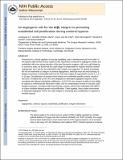| dc.contributor.author | Li, Longxuan | |
| dc.contributor.author | Welser-Alves, Jennifer | |
| dc.contributor.author | van der Flier, Arjan | |
| dc.contributor.author | Boroujerdi, Amin | |
| dc.contributor.author | Milner, Richard | |
| dc.contributor.author | Hynes, Richard O | |
| dc.date.accessioned | 2016-02-25T16:10:43Z | |
| dc.date.available | 2016-02-25T16:10:43Z | |
| dc.date.issued | 2012-06 | |
| dc.date.submitted | 2012-06 | |
| dc.identifier.issn | 00144886 | |
| dc.identifier.issn | 1090-2430 | |
| dc.identifier.uri | http://hdl.handle.net/1721.1/101277 | |
| dc.description.abstract | Fibronectin is a critical regulator of vascular modelling, both in development and in the adult. In the hypoxic adult central nervous system (CNS), fibronectin is induced on angiogenic vessels, and endothelial cells show strong induction of the two fibronectin receptors α5β1 and αvβ3 integrins. In a previous study, we found that the αvβ3 integrin is dispensable for hypoxic-induced cerebral angiogenesis, but a role for the endothelial α5β1 integrin was suggested. To directly investigate the role of endothelial α5 integrin in cerebral angiogenesis, wild-type mice and mice lacking α5 integrin expression in endothelial cells (α5-EC-KO) were subject to hypoxia (8% O[subscript 2]) for 0, 2, 4, 7 or 14 days. Quantification of cerebral vessel density and endothelial-specific proteins claudin-5 and Glut-1 revealed that α5-EC-KO mice displayed an attenuated angiogenic response, which correlated with delayed endothelial proliferation. α5-EC-KO mice showed no defect in the ability to organize a cerebrovascular fibronectin matrix, and no compensatory increase in vascular αvβ3 integrin expression. Consistent with these findings, primary α5KO brain endothelial cells (BEC) in culture exhibited delayed growth and proliferation. Taken together, these studies demonstrate an important angiogenic role for the α5β1 integrin in promoting BEC proliferation in response to cerebral hypoxia. | en_US |
| dc.description.sponsorship | National Institutes of Health (U.S.) (PO1-HL66105) | en_US |
| dc.description.sponsorship | National Institute of General Medical Sciences (U.S.). Cell Migration Consortium (GC11451.126452) | en_US |
| dc.language.iso | en_US | |
| dc.publisher | Elsevier | en_US |
| dc.relation.isversionof | http://dx.doi.org/10.1016/j.expneurol.2012.06.005 | en_US |
| dc.rights | Creative Commons Attribution-Noncommercial-NoDerivatives | en_US |
| dc.rights.uri | http://creativecommons.org/licenses/by-nc-nd/4.0/ | en_US |
| dc.source | PMC | en_US |
| dc.title | An angiogenic role for the α5β1 integrin in promoting endothelial cell proliferation during cerebral hypoxia | en_US |
| dc.type | Article | en_US |
| dc.identifier.citation | Li, Longxuan, Jennifer Welser-Alves, Arjan van der Flier, Amin Boroujerdi, Richard O. Hynes, and Richard Milner. “An Angiogenic Role for the Α5β1 Integrin in Promoting Endothelial Cell Proliferation During Cerebral Hypoxia.” Experimental Neurology 237, no. 1 (September 2012): 46–54. | en_US |
| dc.contributor.department | Massachusetts Institute of Technology. Department of Biology | en_US |
| dc.contributor.department | Koch Institute for Integrative Cancer Research at MIT | en_US |
| dc.contributor.mitauthor | van der Flier, Arjan | en_US |
| dc.contributor.mitauthor | Hynes, Richard O. | en_US |
| dc.relation.journal | Experimental Neurology | en_US |
| dc.eprint.version | Author's final manuscript | en_US |
| dc.type.uri | http://purl.org/eprint/type/JournalArticle | en_US |
| eprint.status | http://purl.org/eprint/status/PeerReviewed | en_US |
| dspace.orderedauthors | Li, Longxuan; Welser-Alves, Jennifer; van der Flier, Arjan; Boroujerdi, Amin; Hynes, Richard O.; Milner, Richard | en_US |
| dc.identifier.orcid | https://orcid.org/0000-0001-7603-8396 | |
| mit.license | PUBLISHER_CC | en_US |
